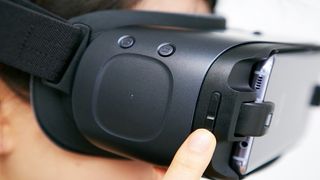New Samsung Gear VR could have a ridiculously sharp screen
Higher resolution than any of the competition

Samsung’s current Gear VR headsets require you to stick a Samsung phone in them to use as the screen and power source, but the next model might both have a built-in screen and massively increase the resolution.
According to industry insiders speaking to Naver, Samsung is working on a new Gear VR model with a 2,000ppi screen. That would be an enormous jump not just on current models, which vary based on the phone placed in them, but top out at under 600ppi, but also on the HTC Vive, which is the most expensive consumer VR product and offers 447ppi per eye.
It’s easy to see how such an improvement could be beneficial. As great as Gear VR is, it’s held back by fuzzy images caused by having the display so close to your face. Such a big jump in resolution should solve that, but it will also apparently help with nausea.
An industry official said: “When using a VR device, the number of ppi should be much larger than it is now to feel natural without feeling dizzy. The higher the resolution, the better the nausea symptoms will be.”
The price of pixels
This isn’t the first time we’ve heard word of a super high-resolution Gear VR, though last time rumors talked of it being 1,500ppi.
Assuming it really is in the works there are still some unanswered questions – will it still require an external device for power for example? The two biggest unknowns though are the launch date and price.
To the former, we’d guess maybe alongside the Samsung Galaxy Note 8 later this year or the Samsung Galaxy S9 early next year – though with the phone possibly being taken out of the equation it could equally launch separately.
Get daily insight, inspiration and deals in your inbox
Sign up for breaking news, reviews, opinion, top tech deals, and more.
As for the price, that’s anyone’s guess right now, but with a screen that sharp don’t expect it to be the budget option that current Gear VR’s are.
Via SamMobile
James is a freelance phones, tablets and wearables writer and sub-editor at TechRadar. He has a love for everything ‘smart’, from watches to lights, and can often be found arguing with AI assistants or drowning in the latest apps. James also contributes to 3G.co.uk, 4G.co.uk and 5G.co.uk and has written for T3, Digital Camera World, Clarity Media and others, with work on the web, in print and on TV.
Most Popular


